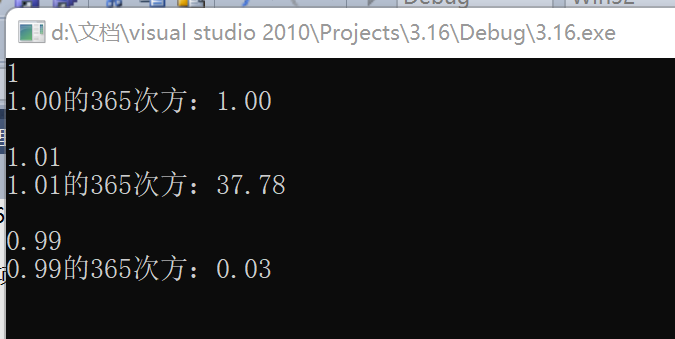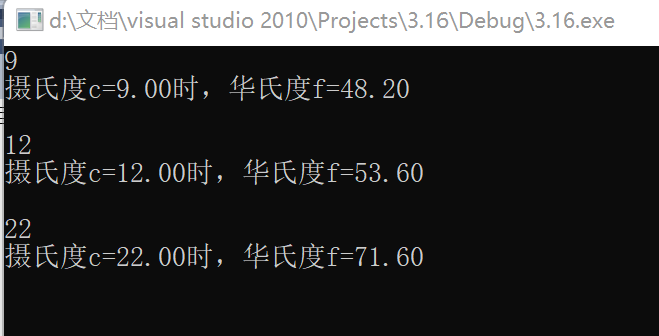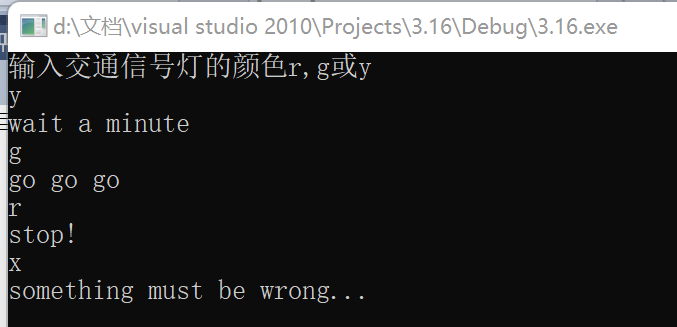实验二
1、程序源码
#include<stdio.h>
#include<stdlib.h>
#include<time.h>
#define N 5
#define R1 586
#define R2 701
int main(){
int number;
int i;
srand(time(0));
for(i = 0;i<N;++i)
{
number = rand()%(R2-R1+1)+R1;
printf("20228330%04d\n",number);
}
system("pause");
return 0;
}
(1)生成一个在R1到R2之间的随机数
(2)随机抽取五个学号
2、程序源码
#include<stdio.h>
#include<stdlib.h>
int main(){
double x, y;
char c1, c2, c3;
int a1, a2, a3;
scanf("%d%d%d", &a1,&a2,&a3);//加入地址符//
printf("a1 = %d, a2 = %d, a3 = %d\n", a1,a2,a3);//分开后加入getchar()//
getchar();
scanf("%c",&c1);
getchar();
scanf("%c",&c2);
getchar();
scanf("%c",&c3);
getchar();
printf("c1 = %c, c2 = %c, c3 = %c\n", c1, c2, c3);//分开后加入getchar(),%f改%lf//
scanf("%lf", &x);
getchar();
scanf("%lf", &y);
printf("x = %f, y = %lf\n",x, y);
system("pause");
return 0;
}
实验截图

3.2、程序源码
#include<stdio.h>
#include<stdlib.h>
#include<math.h>
int main(){
double x,ans;
while(scanf("%lf",&x)!=EOF)
{
ans=pow(x,365);
printf("%.2f的365次方:%.2f\n",x,ans);
printf("\n");
}
system("pause");
return 0;
}
实验截图

3.3、程序源码
#include<stdio.h>
#include<stdlib.h>
#include<math.h>
int main(){
double c,f;
while(scanf("%lf",&c)!=EOF)
{
f=((9*c)/5+32);
printf("摄氏度c=%.2f时,华氏度f=%.2f\n",c,f);
printf("\n");
}
system("pause");
return 0;
}
实验截图

4、程序源码
#include<stdio.h>
#include<stdlib.h>
#include<math.h>
int main(){
char c;
printf("输入交通信号灯的颜色r,g或y\n");
while(scanf("%c",&c)!=EOF)
{switch(c)
{
case'r':
printf("stop!\n");
break;
case'g':
printf("go go go\n");
break;
case'y':
printf("wait a minute\n");
break;
default:
printf("something must be wrong...\n");
break;
}
scanf("%c",&c);
}
system("pause");
return 0;
}
实验截图

5、程序源码
#include<stdio.h>
#include<stdlib.h>
#include<math.h>
#include<time.h>
int main(){
int number,day,n;
int i=1;
printf("猜猜你的lucky day\n开始喽你有三次机会,猜吧(1~30)\n");
srand(time(0));
number = rand()%(30+1);
while(i<4)
{scanf("%d",&day);
getchar();
if(day==number)
printf("哇,猜中了\n");
else
{if(number<day)
printf("你猜的日期晚了,lucky day已经过了\n");
else
printf("你猜的日期早了,lucky day还没到哦\n");}
i++;
if(day==number)
break;
else
i;
if(i==4)
printf("%d",number);
else
i;
}
system("pause");
return 0;
}
实验截图


6、程序源码
#include<stdio.h>
#include<stdlib.h>
#include<math.h>
#include<time.h>
int main(){
int i,j;
i=1;
while(i<10)
{i++;}
i=1;
while(i<10)
{printf("\n");
j=1;
while(j<=i)
{printf("%dx%d=%d\t",i,j,i*j);
j++;}
i++;}
i++;
system("pause");
return 0;
}
实验截图

7、
实验原理
当输入为n时:
第i行,需要打印(2(n-i)-1)个字符小人
第i行,前面需要打印(i-1)个空白
程序源码
#include<stdio.h>
#include<stdlib.h>
#include<math.h>
int main(){
int n,m,a,i;
i=0,m=1,a=1;
scanf("%d",&n);
while(i<3*n)
{m=1;
a=1;
if(i%3==1)
{
while(m<=(i-1)/3)
{printf(" \t");
m++;}
while(a<2*(n-(i-1)/3))
{printf("<H>\t");
a++;}}
else
{if(i%3==2)
{
while(m<=(i-2)/3)
{printf(" \t");
m++;}
while(a<2*(n-(i-2)/3))
{printf("I I\t");
a++;}}
else
{if(i%3==0)
{
while(m<=(i/3))
{printf(" \t");
m++;}
while(a<2*(n-i/3))
{printf(" o\t");
a++;}}
else
i;
}}
printf("\n");
i++;}
system("pause");
return 0;
}
实验截图




